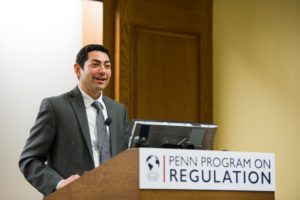
The Supreme Court rejects a challenge to the Affordable Care Act, the Biden Administration releases its regulatory agenda, and more…
IN THE NEWS
- The U.S. Supreme Court declined to review the constitutional challenges to the minimum essential coverage provision of the Affordable Care Act (ACA) on the grounds that the plaintiffs, 18 states and 2 individuals, lacked eligibility—or standing—to bring suit. The minimum essential coverage provision requires individuals who are not otherwise exempt to have a qualifying health care coverage plan or pay a tax penalty. The Court reasoned that the plaintiff individuals were not injured for failing to meet the ACA’s minimum health care coverage requirements because the resultant tax penalty was reduced to $0 in 2017. Similarly, the Court held that the plaintiff states had not demonstrated that they suffered harm from an unlawful federal action. In response to the ruling, Texas Attorney General Ken Paxton said that he “will continue to fight” the ACA.
- The Biden Administration released its first Unified Agenda of Federal Regulatory and Deregulatory Actions detailing the priorities and plans of federal agencies and reporting their recent actions. Many proposed actions reverse policies implemented by the Trump Administration, including plans to reverse Trump-era fuel economy standards back to maximum levels for passenger vehicles, propose disclosure rules for corporate board diversity and climate-related risks, and tighten regulations around oil and gas emissions and leasing. Sharon Block, acting Administrator of the Office of Information and Regulatory Affairs, said that the agenda demonstrated a commitment to “rolling back the obstacles to recovery, equity and sustainability that the prior Administration put in place.”
- The Supreme Court unanimously ruled that the city of Philadelphia violated the Free Exercise Clause of the First Amendment by refusing to refer foster children to the Catholic Social Services after discovering the Catholic agency’s policy against certifying same-sex married couples to become foster parents. Philadelphia argued that the Catholic agency’s refusal to certify same-sex married couples violated non-discrimination contract provisions and a citywide ordinance against discrimination. The Court held that although governments have a compelling interest in enforcing non-discrimination policies, these policies must be applied neutrally—which Philadelphia failed to do because it allowed for exceptions to be granted but did not have a compelling reason not to grant one to Catholic Social Services. Leslie Cooper, deputy director of the ACLU LGBTQ & HIV Project, said, “the court reached a narrow, very fact-specific decision that leaves non-discrimination laws and policies standing and fully enforceable by governments.”
- The U.S. Court of Appeals for the Fourth Circuit affirmed the lower court decision that North Carolina laws banning and restricting abortions after 20 weeks are unconstitutional, rejecting the state’s claim that the plaintiffs were not eligible to bring suit. North Carolina alleged that the plaintiffs—North Carolina abortion providers—lacked a credible threat of prosecution for violating the state’s laws—one of three necessary elements to bring a claim in federal court. The State argued that the plaintiffs would not likely face prosecution for violating abortion laws because the state had not enforced abortion laws in nearly 50 years. The Fourth Circuit, however, held that the recent amendments to North Carolina’s abortion laws further restricting abortion access and the momentum of a national movement to increase abortion restriction gave credibility to the plaintiffs’ fears of prosecution. This decision came amid a push from anti-abortion activists and politicians to weaken abortion protections provided by Roe v. Wade.
- The U.S. Food and Drug Administration (FDA) announced that it authorized a batch of the Johnson & Johnson coronavirus vaccine for emergency use from its Emergent BioSolutions plant, which reportedly contained 14 million doses. The authorization comes days after FDA ordered the company to dispose of four batches suspected of cross-contamination with the AstraZeneca vaccine, reportedly amounting to 60 million doses. FDA has said it will continue to conduct a thorough review of facility records at the Emergent BioSolutions plant, but it is not yet ready to include the plant as an authorized manufacturing facility.
- The U.S. Department of Education issued a notice of interpretation explaining that it would include sexual orientation and gender identity in its Title IX prohibition of “discrimination on the basis of sex.” Title IX protects students from sex-based discrimination in federally funded education programs and activities. The Education Department’s announcement comes a year after Bostock v. Clayton County, which expanded the definition found in Title VII of the Civil Rights Act, which protects employees from sex-based discrimination. Secretary of Education Miguel Cardona said the announcement clarifies that “LGBTQ+ students deserve the opportunity to learn and thrive in schools that are free from discrimination.”
- Judge Terry Doughty, a federal judge for the U.S. District Court for the Western District of Louisiana, temporarily blocked the Biden Administration’s pause on all new oil and gas leases, which are required for drilling on federal lands. Several states brought the suit claiming damages including lost jobs in the oil and gas sector, lost revenues from royalty payments, and higher gas prices. Judge Doughty blocked the executive order in part because he concluded that the states that brought the suit would face “irreparable harm” if the pause was kept in place while the case is in court.
- In a 69-28 vote, the U.S. Senate confirmed Lina Khan as a Commissioner of the U.S. Federal Trade Commission (FTC). Following the vote, President Joseph R. Biden appointed Khan as chair of the FTC. Khan is known for advocating antitrust law reform to protect consumers from anti-competitive behavior in digital markets. Khan’s confirmation established a Democratic majority on the FTC, with three Democratic and two Republican commissioners. This majority, however, may be temporary, as current FTC commissioner Rohit Chopra has been nominated to lead the Consumer Financial Protection Bureau.
- The Biden Administration released a plan, as part of the Administration’s agenda, to “repeal or replace” a Trump Administration rule that lifted the prohibition of logging and road construction on parts of the Tongass National Forest in Alaska. The Trump Administration exempted the Tongass National Forest from the Clinton-era Roadless Rule that protected nearly 60 million acres of land in the national forests from timber harvesting and road construction. Opponents of the Biden Administration plan reportedly argued that prohibiting logging could lead to lost jobs. Many environmentalists, on the other hand, praised the decision for the impact the forest protections will have on addressing climate change.
WHAT WE’RE READING THIS WEEK
- In an article in The New England Journal of Medicine, University of Pennsylvania Law School professor Anita Allen analyzed the progress and future of health information privacy and regulation under the Health Insurance Portability and Accountability Act of 1996 (HIPAA), which will turn 25 years old in August. Allen argued that privacy for medical information is still imperative even as norms around health disclosure in the United States shift toward transparency. Allen noted, however, that HIPAA as a regulatory framework is well suited to adapt to changes in societal expectations of privacy and innovation. Allen concluded that HIPAA has “paved the way” in providing access to quality health care through “strong, well-informed regulations.”
- In a report for the Center for American Progress, Alexandra Thornton, senior director for Tax Policy and Economic Policy at the Center, and Tyler Gellasch, executive director of the Healthy Markets Association, explained that the U.S. Securities and Exchange Commission (SEC) can require companies to disclose information about their climate, environmental, social, and governance risks and practices. Thornton and Gellasch argued that climate transparency is central to the SEC’s mission to protect investors, promote fair and efficient markets, promote capital formation, and protect the public interest. Thornton and Gellasch concluded that the SEC is not only able to require such disclosures, it also has the obligation to do so.
- In a recent National Bureau of Economic Research working paper, Colin Gray, a senior economist at Wayfair, and his coauthors studied the impacts of work requirements on Supplemental Nutrition Assistance Program (SNAP) recipients. SNAP work requirements state that beneficiaries must look for work and undergo employment training, take a job if offered one, and not quit a job without good reason. Gray and his coauthors found that the SNAP work requirements reduced participation in the program by about 53 percent, but also found that the requirements had no impact on the number of people working. Gray and his coauthors theorized that work requirements for SNAP may not provide strong enough incentives to outweigh the other reasons program beneficiaries are not working.
FLASHBACK FRIDAY
- In an essay in The Regulatory Review, Professor Rachel Rebouché of Temple University argued that June Medical Services v. Russo—a 2019 Supreme Court decision that struck down a requirement that abortion providers have admitting privileges at a hospital within 30 miles—did not offer a clear answer on what type of restrictions a state could place on abortions. Rebouché argued that some onerous state-imposed obstacles to abortion will be found unconstitutional, while other laws that only impose minimal burdens on abortion procedures will be allowed to stand. June Medical simply did not provide a clear dividing line.



